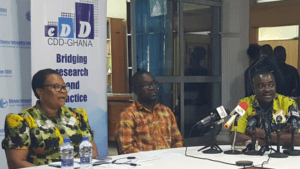By Buertey Francis BORYOR
Stakeholders including government, political parties, civil society and voters have been urged to initiate critical steps toward addressing the increasing challenges surrounding campaign financing and the abuse of state resources in the country’s elections, to ensure that its democratic processes and institutions are not compromised.
Such problems, if not tackled in time, according to Ghana Centre for Democratic Development’s (CDD-Ghana) Director-Programmes and Operations Frederick Adu-Gyamfi, can create conditions that foster corruption, mismanagement and abuse of incumbency.
He additionally said they could undermine fairness of the electoral process and divert critical resources from public projects – such as road development, healthcare and education – into political campaigns.
“Money is undeniably a key player in modern politics. It wields a double-edged sword – while it has the potential to develop and enhance our democracy, it can also compromise democratic processes and institutions.
“Over the years, the use of money in politics has grown to alarming levels; creating conditions that foster corruption and mismanagement. A study conducted by the Westminster Foundation for Democracy (WFD) and CDD-Ghana estimated that running for a presidential seat costs about GH¢575million, while running for a parliamentary seat costs approximately GH¢4million,” he elaborated.
Worryingly, he said that although the Political Parties Act 2000 (Act 574) requires them to disclose their accounts after elections, these disclosures rarely happen – and there is minimal enforcement from the Electoral Commission.
“Political campaigns are resource-intensive and funded through private donations, party membership fees and other often undisclosed sources.”
He added that this lack of transparency, coupled with the absence of a cap on campaign expenditure, has created an environment where elections are influenced more by financial power than by the people’s will.
“For instance, if a Member of Parliament spends over US$70,000 on a campaign, they are more likely to focus on recouping their investment rather than serving the public interest. Equally concerning is the misuse of state resources during elections, a practice that unfairly tips the scales in favour of incumbents,” he elaborated.
Also, he highlighted that despite constitutional safeguards such as Article 55 (11)(12) which mandates equal access to state media and Article 284 which prohibits conflicts of interest for public officials, there have been numerous instances of misusing government assets and undue advantages for the ruling party in past elections.
While cautioning politicians against excessive use of money to influence voter decisions in their drive for power, he emphasised that abusing state resources not only distorts electoral competition but also erodes public trust in the democratic process.
Mr. Adu-Gyamfi said this at the ‘Monitoring Campaign Spending, Abuse of incumbency and Vote Buying for Comprehensive Party Campaign Financing Reform in Ghana’ project’s media launch in Accra.
Meanwhile, Ghana Integrity Initiative’s (GII) Executive Director Mrs. Mary Awelana Addah in remarks at the event said monitisation of our voting procedures will not help us get our democracy to a level that we can all be proud of.
She added that abuse of state resources to the advantage of incumbent governments during elections is a common practice in many countries, including Ghana – citing the illegal use of government vehicles or buildings by the ruling party’s election campaign team; manipulation of state media; and use of security agencies to intimidate opponents as examples of such abuses.

The Monitoring of Campaign Spending project is in collaboration with the GII, Ghana Anti-Corruption Coalition (GACC) and CDD-Ghana
It aims to generate additional empirical data on campaign financing activities and increase public awareness on the role of money in elections and the current campaign finance regime.
It involves a campaign finance-monitoring mission and a public awareness campaign. The monitoring mission will track expenditures, abuse of state resources and vote buying in the 2024 presidential elections.










